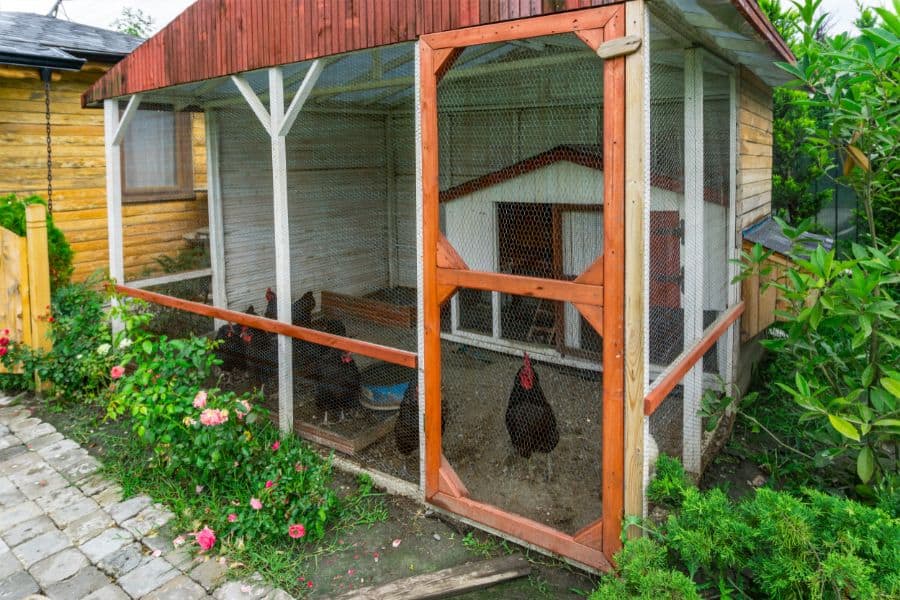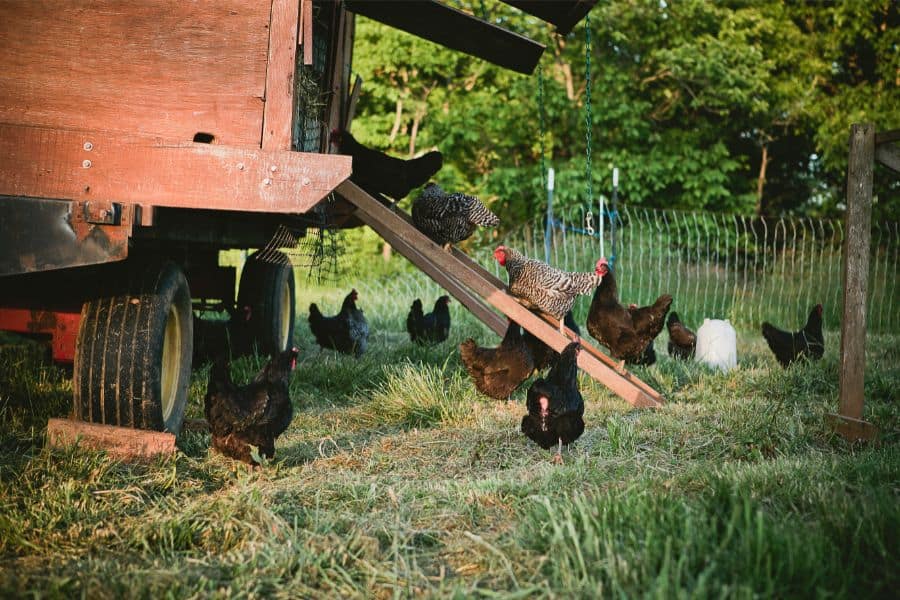If you’ve decided to start keeping backyard chickens, you’re at the beginning of an exciting and rewarding journey.
Not only will your birds give you a steady supply of eggs, but they will also give you endless hours of entertainment with their idiosyncratic antics.
However, to keep your chickens healthy and productive, an important consideration is how much living space to give them – and some city dwellers might also be wondering whether it’s possible to keep a chicken on a balcony.
So to help you understand the details, in this post, we answer the question, how much space do chickens need?
How Much Room Do Chickens Need?
When choosing the size of your chicken coop and run, many factors can affect how much space they need, and we’ll get into this in just a moment.
However, we can start by giving some guidelines for what should be considered the minimum amount of space you’ll need per bird.
Generally speaking, chickens can be divided into three size categories, bantam, standard and large breeds – so let’s break down how much space each type needs now.
Standard Chickens
Generally speaking, if you are keeping a flock of standard-sized chickens, you will need a coop of at least four square feet per bird. So, for example, if you have a flock of five birds, this means you will need a coop with dimensions of at least 20 square feet.
In terms of the run, you’ll need a minimum of eight square feet per bird – so for a flock of five chickens, you’ll need a run that measures at least 40 square feet.
You’ll also need a roost that provides at least eight inches per bird, and you’ll need one nesting box for every four or five hens. Nesting boxes for standard chickens need to be 12 inches wide, 12 inches high and 18 inches deep.
Large Chickens
Large chicken breeds need more space than regular chicken breeds, so they require a coop that measures at least eight square feet per bird. They also need a run that measures a minimum of 15 square feet per bird.
This means for a flock of five chickens, you’ll need a coop that measures 40 square feet and a run that measures 75 square feet.
The roosts for this size of chicken need to provide at least 12 inches per bird, and you’ll need one nesting box per four or five chickens measuring around 14 inches wide by 14 inches high and 20 inches deep.
Bantams
Bantams are tiny chickens that can be as small as a quarter the size of a regular chicken, and this means you’ll need a lot less space to keep them.
Their coop needs to measure two square feet per bird and the run should be at least five square feet per bird. This means for a flock of five bantams, you’ll need a coop measuring 10 square feet and a run that measures 25 square feet.
The roosts should offer at least six inches per bird, and you’ll need one nesting box for every four or five chickens you keep with dimensions of 12 inches wide by 12 inches high by 10 inches deep.
Here’s all this information broken down in a table.
| Size | Coop | Run | Roost | Nesting boxes |
| Bantam | 2 ft. sq. per bird | 5 ft. sq. per bird | 6”/bird | 12”x12”x10” – 1 per 4-5 hens |
| Standard | 4 ft. sq. per bird | 8 ft. sq. per bird | 8”/bird | 12”x12”x18” – 1 per 4-5 hens |
| Large | 8 ft. sq. per bird | 15 ft. sq. per bird | 12”/bird | 14”x14”x20” – 1 per 4-5 hens |
Also Read: How Many Hens Per Rooster?
Variables Affect How Much Space Chickens Need
What we have given above should be considered the minimum amount of space that chickens need – but of course, if you can give your chickens more space than this, they will be much happier for it.
As we’ve seen, the main two variables that determine how big your coop and run need to be are the size of your flock and the size of the breeds you are keeping.
However, many other factors can affect the optimum size of the coop and the run that you provide for them, so let’s look at some of the most important now.
Climate
The climate where you live can be important since in colder areas, your birds are likely to spend more time in the coop during the winter, so ideally, this means it needs to be larger than the minimums we suggested above.
Conversely, in warmer climates, your birds are likely to spend more time outside, so it’s better to prioritize a bigger run if possible.
At the same time, if you live in an area that experiences particularly hot summers, larger coops will allow more airflow inside the coop – and a tall, well-ventilated coop is ideal for helping to keep your chickens cool inside.
Another factor to consider is whether you frequently experience strong storms in your area. If you do, you should also provide extra space inside the coop for when your chickens need to be shut away for longer periods – and you’ll also need to make sure your coop is stormproof.
Lifestyle
The way your chickens live also determines to a certain extent how big their coop and run should be.
For example, if you let your chickens free-range for most of the day, they don’t need an especially large coop, and sticking to the guidelines we’ve given for the minimum size can be acceptable.
However, if your birds are likely to spend more of their time inside, then it’s essential to provide them with a larger coop to compensate.
Layout and Contents
It’s a great idea to provide chickens with plenty of things to keep them busy, and chicken swings, perches, ramps, tunnels and all kinds of other things for them to play with or explore are recommended for alleviating boredom.
However, if you give them too much entertainment, it might end up reducing their living space, so you’ll need to increase the size of the run to compensate.
Similarly, when calculating the size inside the coop, you should also take into account how much space things like feeders and waterers take up – because although the floor space might be technically ok, these extras inside might end up leaving them feeling cramped.
Breed and Temperament
Another important factor to consider is the temperament of the chickens you are keeping since some breeds tend to be bossier and more assertive while others are more passive and laidback.
If you intend to keep chickens that are known to assert their dominance, you’d better plan to build a larger coop and run because this will give your birds enough space to live together in peace.
Local Guidelines
Finally, you should also check out the local guidelines for where you live since some jurisdictions may have rules about the minimum amount of space chickens must be given.
It could be that your local area stipulates that chickens need a larger area to live in than the minimums we suggested above – in which case, you should follow your local guidelines.
Why Do Chickens Need Space?
Local laws aside, why is it important for chickens to be given plenty of space to live in? Some people might think that they’re just dumb animals and that they don’t care how much space they have – but this couldn’t be further from the truth.
There are lots of good reasons why you should give your birds as much space as possible, and here are some of the most important.
Health
One of the main reasons chickens need plenty of space is that if they are kept in small, confined spaces, it can be detrimental to their health.
If chickens are kept in cramped conditions, it makes it easier for bacteria and other microorganisms to breed, and this can lead to the spread of disease throughout your flock.
Similarly, if birds are kept in too close proximity, it makes it much easier for parasites to spread, so as soon as one of your birds is infected, the rest of your flock will be too.
Stress
Cramped conditions can be extremely stressful for chickens, and you will find there are far more conflicts over pecking order if their coop and run are too small.
In confined spaces, chickens feel more need to fight to establish their position relative to the other birds in the flock, and the increased stress levels this causes will impact your birds’ health and productivity.
Antisocial Behavior
When chickens don’t have enough space, it encourages antisocial behaviors such as bullying, fighting and feather pulling.
This is partly due to the stressful living conditions they are having to endure and partly due to boredom – and giving them enough space to live can help reduce such behaviors.
Productivity
Chickens that have plenty of space in their coop, that don’t need to fight for a spot to roost and that have plenty of space to roam and forage during the day are likely to be much happier birds – and happy chickens are more productive chickens.
This means if you want your hens to give you plenty of eggs, giving them enough space for them to live happy lives will help increase their egg-laying performance.
General Cleanliness
Small, cramped coops and tiny runs also get dirty much more quickly. The chicken poop will quickly accumulate, and this is likely to contaminate their water and feed.
They will also spend lots of time simply walking around in their own muck, which can quickly lead to disease.
For these reasons, it’s far better to give them plenty of space to help keep them clean and healthy.
Related: Chicken Run Ideas
Tips for Space for Chickens
To finish, here are a few tips for ensuring your chickens have enough space to live healthy and happy lives.
Chicken Tunnel
If it’s not convenient for you to allow your chickens to free range or if you don’t have the space for a large, open run, another option is to build a chicken tunnel.
Chicken tunnels allow your birds much more space to forage while also keeping them where you want them and keeping them safe from predators.
They’re also cheap and easy to build, so this could be an idea to consider.
Mixed Flocks
If you have a mixed flock with different-sized birds, the best way to calculate the size of the run is simply to count them all as though they were all the largest size of chicken you have.
For example, if you have two large birds, two standard-sized ones and a bantam, the easiest way to work it out is just to build the coop and run as if you had five large birds.
However, if you had one large chicken and four bantams, you wouldn’t need to do this – so in this case, you can use your common sense.
Plan for The Future
If you are just starting out with chicken keeping and just have three or four birds, it’s best to plan for the future and build big to accommodate a growing flock.
The worst that can happen is that if you never add chickens to your flock, your birds will have a larger living area, for which they’ll be grateful – but if you decide you want to add more birds later, you’ll already have the capacity.
Can You Keep a “House Chicken” as A Pet?
Backyard chicken keeping is growing rapidly in popularity, but what about if you don’t have a backyard? Can you keep a chicken as a pet in a city apartment or on a balcony?
While you may technically have enough space for this – and you can even buy chicken diapers to stop them pooping everywhere – there are several reasons why it’s inadvisable.
First, chickens need space to roam and forage, and if you keep them on a balcony, their opportunities for this will be limited – a balcony would be quite an unnatural environment for a chicken to live in.
Next, although they can’t fly, chickens can jump higher than you might expect, so you’d have to take precautions to prevent them from jumping over the side of your balcony.
Finally, chickens are social animals, so you would ideally need to have at least two or more to ensure they don’t get lonely, making it even more challenging to keep them in an apartment.
So while it can be made to work if you decide it’s something you really want to try – and if your building management allows it – unless you have a particularly large terrace where your chickens can roam and forage, it’s probably best not to keep chickens in an apartment setting.
Also Read:
Give Them as Much Space as You Can
In this post, we’ve given you an idea of what should be considered the minimum amount of space required per bird when constructing your run, but that’s all it is – a minimum.
However, chickens enjoy having lots of space to roam, allowing them to forage and explore naturally – so the best answer to how much space you should give to your chickens is that you should give them as much space as you can!


